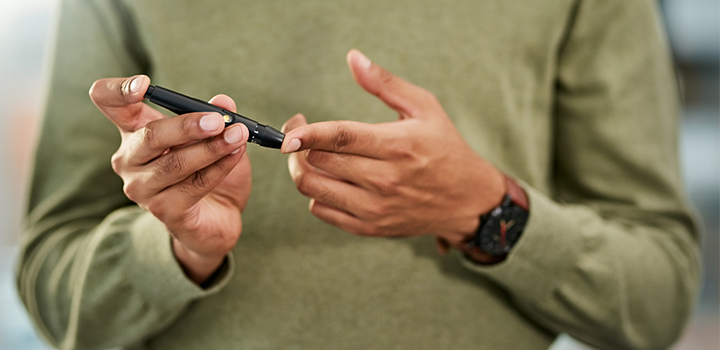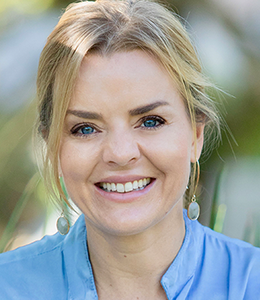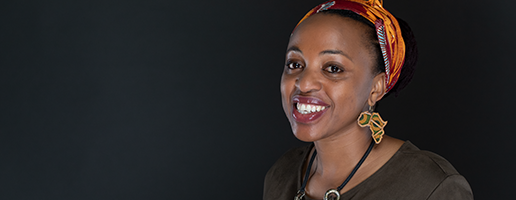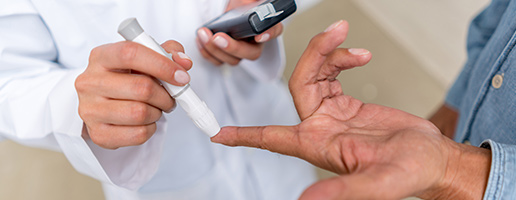“We only have one body”: how to fight diabetes

This National Diabetes Month, we spoke to endocrinologist and specialist diabetologist Dr Joanna Skelton about the myths around diabetes, how patients can gain control of the condition, and the importance of making good lifestyle choices.
Helping patients control diabetes
“Diabetes has always been an area of interest for me as it’s a lifelong disease and there’s a tremendous amount that we can offer patients to help them gain control of their diabetes,” says Dr Joanna Skelton, an endocrinologist and diabetologist based in Umhlanga in KwaZulu-Natal.
“I believe in holistic medicine and in seeing a patient in their entirety, and tackling all areas of health. There’s nothing more rewarding for me than watching a patient transform from being scared of their disease to gaining control of their lives and living more positively.”

Dr Joanna Skelton, Discovery Foundation alumna, endocrinologist and diabetologist
We have one body. Looking after it is essential.
November is Diabetes Awareness Month and in South Africa, there are over 1.8 million adults living with diabetes, while around 1.5 million adults are living with undiagnosed diabetes. The World Health Organization estimates that by 2030, diabetes will be the seventh leading cause of death worldwide.
Now more than ever, it’s important to start educating patients and healthcare workers on how to better manage the condition. “Getting back to the basics is important,” says Dr Skelton. “The biggest challenge I see in South Africa is the one aspect that patients themselves can improve on: lifestyle, lifestyle, lifestyle!
The obesity pandemic is real, and so often patients make poor dietary choices and they do minimal exercise. We have one body. Looking after it, and appreciating it, is essential.”
Early treatment means early control
“Taking responsibility for your health starts with making healthy food choices, watching portion sizes, exercising, taking your prescribed medicine and following up with your clinics. Educate yourself about diabetes as much as you can,” Dr Skelton advises.
“The first thing that I tell my patients when they’re seeing me for the initial consult is that they don’t need to fear their diabetes. I promise them that they are able to gain control of their blood sugars and be empowered. We aim for health, not disease,” she adds.
“Get your sugar tested if you are overweight or have a strong family history of diabetes. And seek help if the sugar is elevated: early treatment means early control. We aim to prevent complications and to allow a patient to lead a full and healthy life.”
Diabetes myths and misconceptions
Dr Skelton says people need to understand that:
- Type 1 and type 2 diabetes are not the same.
“Type 1 is a lack of insulin being produced by the pancreas: these patients are often not overweight and need treatment with insulin from the start. Type 2 tends to run in families, is often associated with being overweight and most of these patients respond well to oral medicine, although down the line they may need insulin,” she explains.
- Insulin does not harm organs!
“Being placed on insulin does not mean that you’re about to die! So often, I’ve heard patients express their reluctance to be started on insulin for this reason and the belief that insulin will harm their organs. Insulin is simply the replacement of a hormone that your body is lacking: not taking insulin when you need it can lead to serious complications because your blood sugar is running high. Insulin will bring your sugar down to the normal range and help to protect your organs from complications.”
Discovery Foundation alumna uses her platform to raise awareness
In 2012, Dr Skelton received a Discovery Foundation Academic Fellowship to study the phenotype of patients with diabetic ketoacidosis – a life-threatening problem that can happen when the body has a lack of insulin – at the University of Cape Town. Today, she is a diabetologist and one of a few female endocrinologists in South Africa.
“With the Fellowship, I was able to research an area of diabetes not well understood in the South African context: type 2 diabetes presenting with a complication that was initially thought to occur exclusively in type 1 patients. This has helped us to understand specific treatments and develop treatment protocols that are in fact somewhat different to those in other countries.”
In addition to her clinical work in Umhlanga, Dr Skelton regularly gives talks to doctors and healthcare workers on how to manage and treat diabetes. “We need to make sure that our GPs are experienced and knowledgeable in the diabetes arena – empowering them to empower their patients.” She also features on Lotus FM where she educates the community on diabetes.
On 9 December 2019, Dr Skelton will be live on Lotus FM from 19:00 to 20:00 talking about the treatments available for diabetes.
About the Discovery Foundation
Each year, the Discovery Foundation gives five different awards to outstanding individual and institutional awardees in the public healthcare sector.
The Discovery Foundation is an independent trust with a clear focus to strengthen the healthcare system by making sure that more people have access to specialised healthcare services.
Since 2006, the Discovery Foundation has invested more than R230 million in training and support for more than 400 medical specialists and institutions. The grants support academic research and clinical science, sub-specialist training, rural medicine as well as programmes to develop public healthcare resources. For 2019, Discovery Foundation awarded 42 grants to medical specialists working in South Africa’s healthcare sector to the value of R27 million.
Learn more and apply for the 2020 Discovery Foundation Awards.
Related articles

Taking small strategic steps to move a mountain
Dr Tumiso Malatji has received a Discovery Foundation Rural Institutional Award to fund a project that will evaluate and improve the management of cardiovascular diseases and diabetes at primary healthcare level at selected clinics in Limpopo.

Amy Rabie gets her mojo back after Type 1 Diabetes diagnosis
Driven by her high-pressure job, Amy Rabie, 24, believed long hours were the cause of her tiredness, headaches, constant thirst and blurry vision. Little did she expect she had life-threatening Type 1 diabetes.

5 diabetes myths and misconceptions: the good, the bad and the ugly
Did you know there are an estimated 1.5 million adults living with undiagnosed diabetes in South Africa? In fact, 50% of people with type 2 diabetes don’t know they have it. Get your stats and facts straight here.